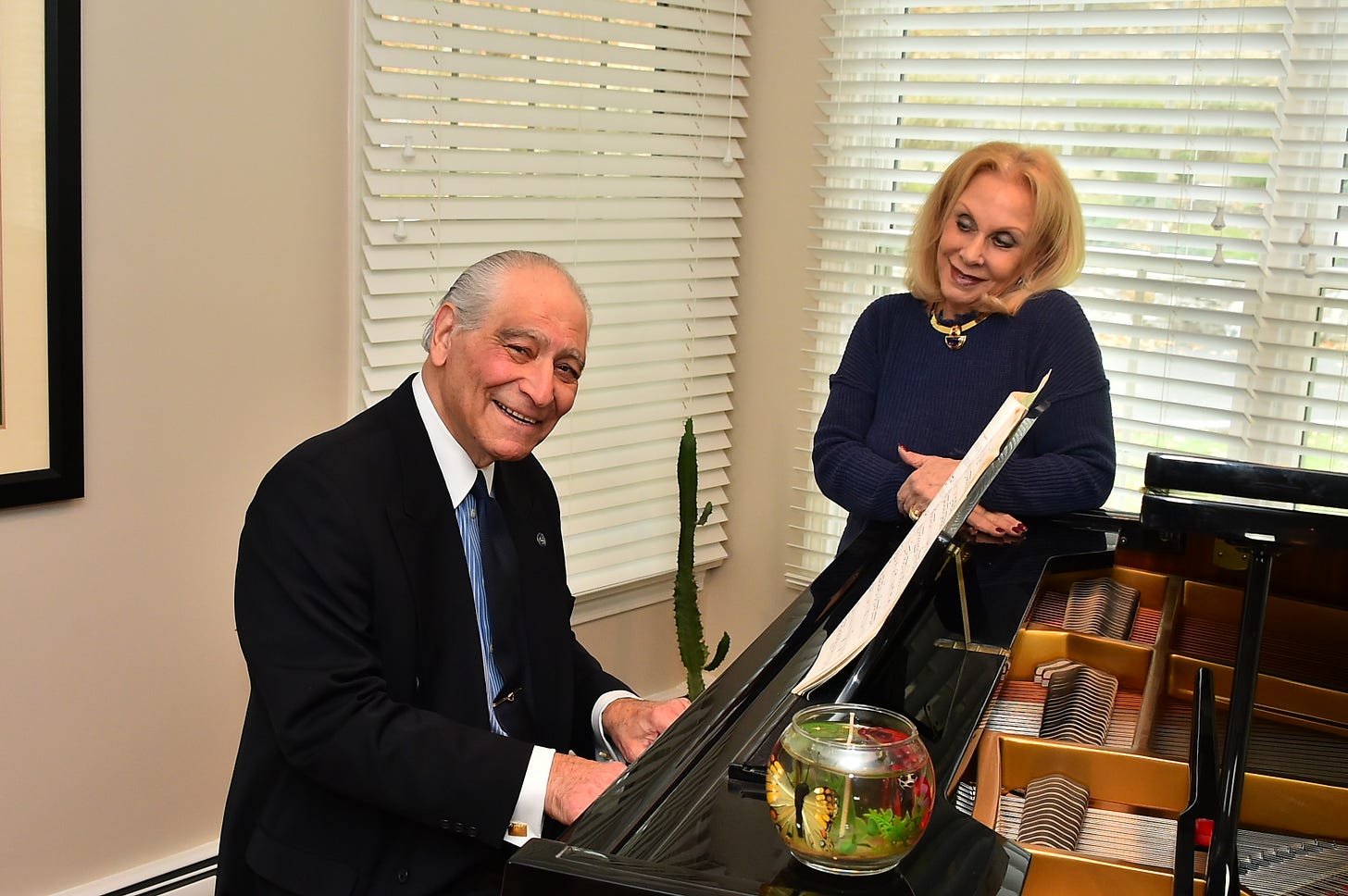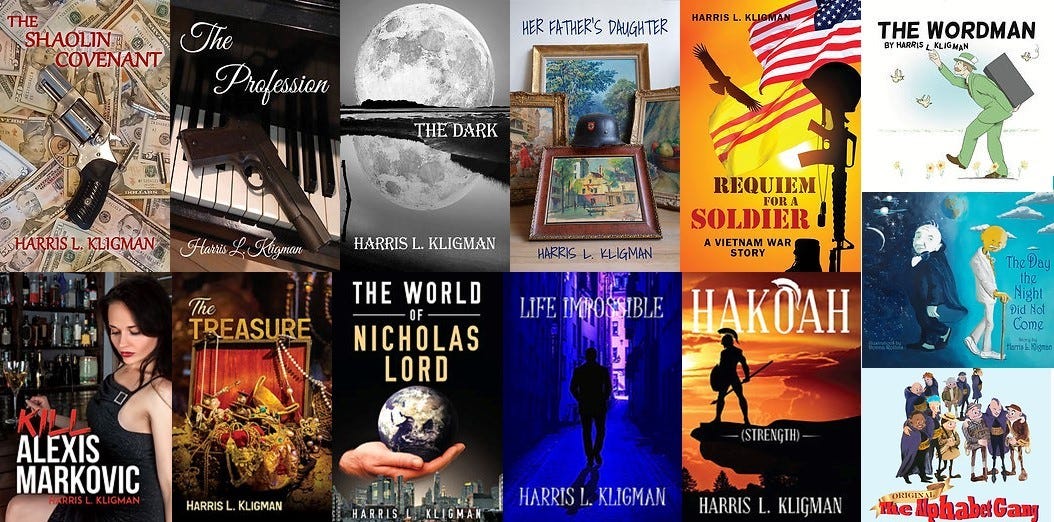How a Retired Army Intelligence Officer Found a New Career in Writing
Harris Kligman discusses his journey to becoming a published author of 10 novels and three children's books in less than three years.
Many years after he retired from being an Army Intelligence Officer, Harris Kligman was approached by his youngest son, Rob, about telling the stories of all the times he was away. As Rob mentioned in an emailed press note, his dad was gone for most of his childhood – which led to many missed birthdays, anniversaries, and other special events. While the now 86-year-old Kligman would always write something while on long plane rides that he would later read to his children, his real-life experiences and the locations to which he traveled were rarely discussed. This conversation with his son inspired Kligman to finally sit down and write about what he witnessed during his travels.
What was expected to be fewer than two pages turned into a 370-page memoir called “Bad Boy,” which has yet to be published. Since then, Kligman continued writing – putting all the events and people he encountered into fictional novels and children’s books. And, as Harris Kligman told me in an exclusive interview, if Rob had not approached him about writing about the times he was gone, this new career as an author would have most likely not happened.
“I liked writing; I have a master’s degree [and] I had no trouble – writing my thesis was part of the requirement for that degree. I’ve always enjoyed the term papers kind of thing, but never thought about writing per se. My life is pretty interesting in the sense of where I’ve been and who I’ve been with – some good people, some not so good, and some in-between. I’ve collected people like a circus collects animals. I store them away for who knows what reason and they become part of these stories now.”
Kligman has certainly lived an intriguing life with his 35 years of traveling around the world and experiencing different places and cultures. For example, Kligman lived in Korea for four-and-a-half years – where he was able to obtain a black belt in Hapkido. He’s become fluent in Korean and many other languages all thanks to his travels.
“I’ve got a wealth of background. It would be easier to tell you what countries I haven’t visited as to those that I have.”
What Kligman would consider a “normal year” consisted of being away from home about 60% of the time. Aside from the celebrations and milestones that he missed, there were other events and home essentials that he missed, too. But, as Kligman said, his wife of almost 55 years, Nancy, was able to handle everything around the house, while he was away.
“I had told her many, many times how grateful and appreciative I was of what she did because had I been in her situation and I lived with a man like me, that did what I did where I did not know when I was coming home, where I was half the time, I would have said to him, “Thank you, but no thank you.” And I would have looked up the best divorce lawyer I could have gotten.”
Kligman attributes his wife’s strength and determination to keeping the marriage intact, but he also noted that, in order for a marriage to last as long as theirs has, there has to be a special bond between each other.
“You can't exist that long and interact with another human being unless there is something that even transcends love. It's a belief and a feeling and compassion for that other person that you could not be or want to live without them. And that's where Nancy and I are.”
When he first started putting his thoughts and stories into book format, Kligman’s writing setup, which included writing “Bad Boy,” consisted of a Windows desktop computer so old that it no longer received updates from Microsoft, an unstable chair with no backing, and a rectangular table too small for the average person. This was all located in the basement of his North Stamford, Connecticut home – which he nicknamed “The Dungeon.” Kligman has since changed his writing arrangement to be much more comfortable and open.
“I moved up to the kitchen area, and I sit down with a glass table and a view in front and back.”
Once “Bad Boy” was finished, Kligman then began writing more stories – all based on the places to which he has been and the people who he met during his time in the Army. People within Harris’ circle would read them and offer their feedback, but they would never go beyond that. Kligman would store them back into a box and put them away with no intention of releasing them to the public. That changed once the COVID pandemic took effect, Kligman said, and his wife and son had suggested publishing the stories for people to read while they were trapped in quarantine – as a way to give them a sense of escapism from what was taking place in the real world.
“The motivator was COVID; the physical motivator was Rob.”
Harris Kligman wasn’t too familiar with the publishing process, he added, but his son stepped in and took over that aspect. And in the last two-and-a-half years, Kligman has now published 10 novels, with an 11th on the way, and three children's books.
“It’s been an interesting and satisfying endeavor, because I’ve always thought that, by writing a book, I’ve created something out of nothing. The person, man or woman, who will pick it up, I’m going to take them to a place, to a situation, to circumstances that they have never visualized – in most cases, cannot relate to – and I’m opening up a new world for them. And, at the end of the story, if I’ve succeeded in getting that reader to say ‘I’ve had a time well spent with this novel,’ I’ve achieved my goal and that’s what I try to do with each one of my stories.”
Kligman doesn’t go through a big publishing company, he says. Instead, his son, Rob, utilizes Amazon’s self-publishing platform for his books and is in charge of promoting the books through Kligman’s blog and various social media outlets.
“To date, we’ve had reasonable success. Am I an Ernest Hemingway? Far from it. But I certainly am a Harris Kligman, and I have written some interesting and captivating novels. So I’m about a mile-and-a-half away from an Ernest Hemingway, but I am running in that direction.”
As for authors that Kligman likes to read, some of his favorites include John le Carré and Wilbur Smith. But he has never tried to be like either of them or any other famous author.
“I wanted to be original both in my story content and the characters I presented. My writing style is interesting. I use, for the most part, simple words – not everybody is able to handle these 15-letter words. When I explain Congo, C.A.R (Central African Republic), and Korea, I use a word picture that the individual who then reads it can conceive, can see, can be there, can feel it – whether it’s hot, whether it’s cold, whether the people are warm, whether the language they use is sarcastic. That’s what I tried to bring into the story so that the reader becomes absolutely the character – whether it’s a man or woman.”
Kligman’s published work thus far has mostly been in the espionage thriller genre with books such as “Kill Alexis Markovic” and “The Profession,” while “Hakoah” and “The Treasure” are more historically based. But the interesting thing about each one of Kligman’s books is that the characters are based on people he met during his travels and some of the experiences he had.
“The names are changed, but they’re all based on people that I’ve interacted with, that I either was forced to work with or wanted to work with – everything from the sons of neo-Nazis and Nazis to absolute crooks and criminals of all stripes, and government officials – mostly military. These people are stored up between my ears.”
The character in “Kill Alexis Markovic,” for example, was based on someone he met in Rio de Janeiro.
“She was an enforcer that I happened to meet through friends of mine. I got to know her slightly. I didn’t know her well, but I knew enough about what she did. And when I thought about the book, I thought about using her but changing her into a Russian woman as opposed to a Brazilian woman – it gave me more solid ground to work with.”
While most of the events that Kligman experienced occurred many years ago, there is still an element of relevancy that he can bring to his novels to keep readers intrigued.
“The Congo, for example, is a country that has never changed. The Central African Republic is a country that has never changed. In the Congo, they’re using children to mine cobalt, lithium, and whatever. These kids don’t last very long because they get infected by all these wonderful elements and when they mine it, their life is little. I bring that into my book. Why do I take the people there? I’ve traveled there; I’ve seen these places. They’re interesting, they’re mysterious, and they’re exotic in many respects. I want to bring the reader into that environment – good, bad, or indifferent – whatever it is.”
Kligman’s writing process is done where he’ll sit down and start writing whatever story he has in mind, he said, and he calls it quits after about one hour. He then repeats the same process the next day and continues until the book is completed. There is no outline that he follows, nor does he have any notes to go by when putting his story together.
“You would mention this to a literary professor at the university and before you could take your seat, he would say you flunked the course. But it works for me. It doesn’t work for everybody, but it works for me.”
When it comes to finalizing the story, Kligman goes back and makes sure to edit for cohesiveness and grammatical errors. He also passes it on to Nancy, Rob, and several of Rob’s friends for additional feedback before getting it published.
“It's easy and it's fun and it's a family effort, and that makes it very worthwhile because the book is maybe written by me, but without Nancy's help or Rob's input and his expertise, it would never see the light of day. And I'm grateful for having them. After all, [they are] family and who would they have the best interest of but me to make sure everything was exactly how it should be. So, it is a family effort and that is the plus, the very big plus sign, in all this endeavor.”
All of Kligman’s published books can be found at Amazon, Barnes & Noble, and Books-A-Million. You can also visit his official website to learn more.




